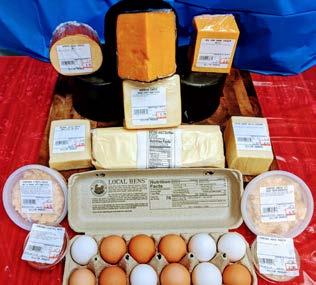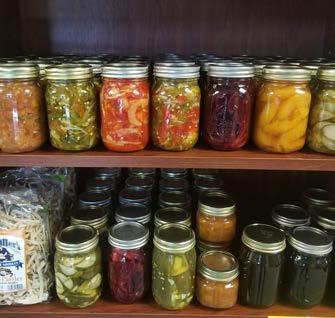
8 minute read
Screens: Remembering the
The Haven
What it does: When Charlottesville residents find themselves without a home, The Haven works to make that situation “rare, brief, and nonrecurring.” In addition to providing temporary housing, the shelter helps unhoused families seek new residences to call home.
Advertisement
How to help: The Haven website lists what a financial donation would fund, from $47 (a day’s worth of showers) to $2,100 (the movein cost for a one-bedroom apartment). Volunteering is limited due to safety restrictions, but low-risk volunteers can apply. In addition to monetary contributions, The Haven is looking for donations of coffee, as well as volunteers to work breakfast shifts over the holidays. thehaven.org
Emergency Food Network
What it does: Customers in need can call the Emergency Food Network once a month to receive kits for three healthy meals. No financial proof of need is required. Meal bags include non-perishables like canned tuna and fresh items like bread and milk.
How to help: All volunteer slots are full, and due to COVID-19 restrictions, food donations can’t be accepted; financial contributions are preferred. According to the Emergency Food Network, small operating expenses mean that about 91 cents of every dollar is spent on food. emergencyfoodnetwork.org
Local Food Hub
What it does: Local Food Hub works to connect local farmers with surplus produce to local consumers who need fresh food. Its Fresh Farmacy program provides those in need with biweekly installments of locally sourced fruits and vegetables.
How to help: Food is already provided by area farmers, so monetary donations are the way to go. Thirty dollars is enough to send a bag of locally grown produce to someone in need. localfoodhub.org
Cultivate Charlottesville
What it does: Cultivate Charlottesville has helped students build gardens at schools across the city. According to CC, gardens built through the program have involved over 2,000 volunteers and produced over 80,000 pounds of food as part of the Food Justice Network, a group of more than 35 organizations working not only to alleviate hunger in the short term, but to attack the problem at its roots. How to help: Volunteers are needed for everything from planting, harvesting, and weed control to outreach and research. Those interested in the organizational aspects of food justice can intern in the Cultivate Charlottesville office. cultivatechar lottesville.org
Free form
Zappa embraces the brilliance and complexity of a non-conformist
By Kristofer Jenson arts@c-ville.com
Adocumentary about the life and work of Frank Zappa is so obvious that it seems like there should already have been four or five of them. Watching Alex Winter’s Zappa, it becomes clear why no one attempted it before, and why Winter is the right filmmaker for the job. How can any one film capture the spirit of a perfectionist who delighted in deconstruction? Zappa was a prolific, genre-hopping creative force with a staggeringly large catalog who was indifferent to recognition. Where do you begin with a life so varied that even his most conventional output defies categorization?
He sounds like an enigma, but he didn’t live like one. Mining the Zappa family vaults, Winter tells Zappa’s story largely in his own words, using archival footage and interviews, most of which had never been seen or heard since they were recorded. Part of Zappa’s genius was the ability to see the way our society places value on the valueless while rejecting anything of substance, and makes idols of one-trick ponies. He lived and reveled among rock stars but was not one of them, detesting drugs, and involving himself as much in the business side of his enterprise as the creative. Their goal was sex, drugs, and rock ‘n’ roll. His was to make music.
Many of the stories in Zappa will be familiar to viewers who have read The Real Frank Zappa Book, his almost-memoir, from his small-town upbringing, finding beauty in things rejected by white suburbia (especially R&B and avant-garde noise music), his arrest for “conspiracy to commit pornography” (yes, really), all the way through his many musical projects and showdown with the Parents Music Resource Center. Winter’s Zappa could be viewed as a companion piece to that book, telling the rest of his story from after the book was published in 1989 to his death from prostate cancer in 1993. Zappa’s goal in life, as he explains several times in the film, was to make music so that he could take it home and listen to it, and if anyone else wanted to listen too, he would make it available to them. Much of his worldview appears to have been shaped by obstacles put in his way, from censorship to businessmen to hollow rock stardom.
Nobody explains Zappa better than Zappa himself, and while The Real Frank Zappa Book lays out his point of view, Zappa explores his wider impact. Interviews conducted with musicians who worked with him, all the way from the earliest incarnation of the Mothers of Invention to his on-and-off-again collabora-
MAGNOLIA PICTURES
The long overdue documentary Zappa details the life of musician Frank Zappa, known for his innovation, virtuosity, and political advocacy.
tors throughout the 1980s, reveal a side of the man not often discussed. He was certainly a perfectionist, and the accurate rendering of what he’d written was a high priority for musicians. Though most of his performers were hired hands, the amount of returning collaborators throughout his work speaks to his relationships with creative people. He wasn’t outwardly compassionate during rehearsal, but the ingenuity of his work and the precision it required was magnetic for those who wanted to devote themselves to it. Comments made by percussionist Ruth Underwood are especially moving; his music broke her out of Juilliard, where she was learning what music should be, while joining the Mothers showed her what it could be, freeing her from playing the triangle in huge orchestras. Near the end of the film, she plays one of the most notoriously difficult Zappa pieces, “The Black Page,” revealing the human dimension of one of his most monstrously technical works.
There would be no Frank Zappa as we know him without his wife Gail, who operated the many dimensions of the family business. Some of the most revealing interviews of the film were conducted with Gail prior to her death in 2015, most notably how she categorizes him. “I married a composer,” she says with a half-proud, half-exhausted grin. “Composer” is telling. Not “musician,” not “perfectionist.” The context in which she used it referred specifically to the less romantic side of being a creative professional and the distance it created. (Both she and Frank are stunningly blunt about his infidelity, neither laughing it off nor dwelling on it.) A rock star’s life is full of passion, explosions of emotion, good and bad, burning out and leaving a compelling (but false) legacy. A composer’s life, meanwhile, is obsessive and never finished. In popular imagination, composers belong to another era and continent, they don’t grow up in 1950s California. Yet that is Frank Zappa, treating even his most rock-infused work with a composer’s sensibility.
Zappa R, 129 minutes Release date: November 27 Alamo Drafthouse Cinema Streaming (Violet Crown Cinema)
The Onion once published a devastating article titled “Frank Zappa Fan Thinks You Just Haven’t Heard The Right Album.” It was painful because it was true. Before this film, there was no entry point. You knew right away whether you were an instant fan, begrudgingly appreciative, or wholly repulsed. Zappa fills an enormous need by effectively condensing the life of a prolific and verbose man without sacrificing an ounce of his complexity.


Local Kites Kathy’s homemade sweet Local honey, jellies, Dungeness Crab Legs
Country Ham breads and pies jams and pickles,
Farm fresh local eggs, homemade cheese spreads, and gourmet cheeses, local oysters and crabmeat, fruits and vegetables HILLTOP FIND US ON FACEBOOK! PRODUCE & SEAFOOD Curbside Pickup! (434) 939-7098 78 Zion Park Road • Troy, VA 22974 Located Behind Chips Woodyard




1% Commission. Full Service Real Estate. Contact Jordan before buying or selling your next home. How does it work?
Selling Your Home? Full service and beyond with new 3D virtual touring, aerial photography services and more for only a 1% listing commission.
Recent Seller Testimonial
Jordan not only found our dream home, his ability to negotiate a great outcome exceeded our expectations. His 1% business model contributed over $5,000 toward our closing costs which allowed us to have more money available to furnish and update our Cville dream home. Highly recommend Jordan! - Pam and Brian S.
Buying a Home? In addition to being your full service Realtor from start to finish, Jordan will pass 1% of the sale price back to his buyer clients at closing which will cover most if not all of your settlement costs.
Recent Buyer Testimonial
Equity Saver USA is the best! Jordan’s (and his team’s) down to earth professionalism and practical advice are a refreshing change for the real estate industry. The competency demonstrated by Jordan far surpasses that of other agents we dealt with during our journey to sell. I wholeheartedly recommend Equity Saver USA for the selling or buying process. — Peter S.
About Jordan
• Top performing broker in Cville. • Over 25 years of successful sales experience. • Sales negotiating certifications from Baygroup
International and Richardson Sales Training
Company. • $18M average annual sales. • Tech Savvy with software tools to canvas area for available homes. • Born and raised
Cville native. • Meriwether Lewis,
Henley, WAHS and JMU alum.

CELEBRATING13 IN CHARLOTTESVILLE





